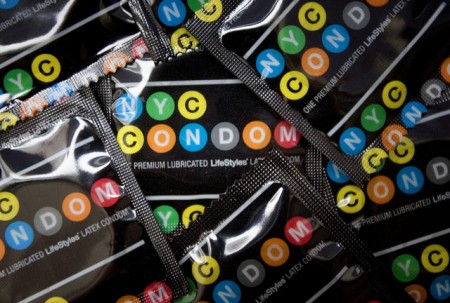By AP
ALBANY, N.Y. — Advocates for sex workers want New York to become the first state to ban police officers from confiscating condoms as evidence in prostitution cases, saying it has a chilling effect on disease protection.
To bolster their case, a group issued a report Tuesday showing that fear of police harassment and arrest has prompted some prostitutes to carry fewer or no condoms and have sex without them, despite massive government giveaways.
“We did find, which is a good thing, that sex workers generally carry condoms and use condoms,” said Sienna Baskin, an attorney with the Sex Workers Project at the Urban Justice Center in Manhattan
But prostitutes also say police also confiscate condoms as a kind of harassment, she said. In surveys, several sex workers said city police took their condoms without arresting them.
Calls to the New York Police Department and Manhattan district attorney’s office were not immediately returned Tuesday.
State Sen. Velmanette Montgomery, a Brooklyn Democrat and sponsor of the bill to ban condom evidence, said she has been told the bill get on the calendar for committee consideration in the Republican-controlled Senate. She said a similar measure has previously passed the Democrat-controlled Assembly.
“We are not endorsing prostitution,” Montgomery said. “It is simply related to the fact that over 100,000 people right now are infected with HIV and AIDS in New York City.”
Alexandra Waldhorn, spokeswoman for the city health department, said Tuesday that the city opposes the pending legislation.
Kate Hogan, a prosecutor who is the former president of the state district attorneys’ association, said the real goal of prostitution cases is “to get the pimps and the sex traffickers.” Giving up supporting evidence would be giving them “a lot of leeway we don’t want to give them,” she said.
In a bid to curb the spread of sexually transmitted diseases, New York City health officials began giving out free condoms in 1971 and say they have given out 192 million since 2007. In a similar program, the state health department said it distributes more than 10 million annually.
The 2010 and 2011 surveys of sex workers were conducted by the New York City Department of Health and Mental Hygiene and by the PROS Network, a coalition of workers and advocates.
The network survey included 35 people who said they worked in the sex trade, with 15 saying police had taken or destroyed their condoms and only five of those saying they were arrested. Six said they had sex later that day or night, and half used a condom.
Of 63 people in the city survey, 36 said their condoms were taken and 26 said they were arrested.
In 2009 in New York City, there were 1,802 arrests for prostitution, a misdemeanor, and 927 arrests for loitering for the purposes of engaging in prostitution, a lesser charge, according to the report.
Human Rights Watch researchers Kathleen Todrys and Megan McLemore said preliminary results from their study of sex workers in New York City, Los Angeles, San Francisco and Washington, D.C., raise similar concerns about groups with high rates of HIV infection – 10 to 14 percent – and high risk for transmission.
McLemore said San Francisco police began photographing condoms for evidence instead of confiscating them after city supervisors in 1996 passed a resolution directing police not to take condoms as evidence, part of that city’s effort to address the AIDS crisis. That still keeps pressure on businesses such as strip clubs and massage parlors to not take free condoms from outreach workers because they still can be used in prosecutions, she said.







